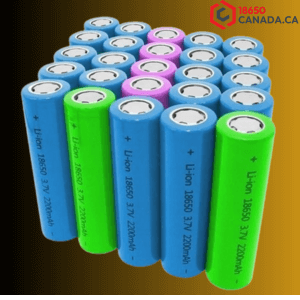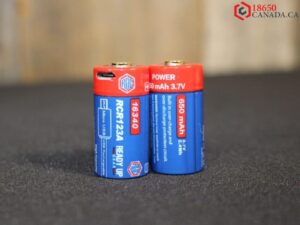The Rise of Lithium-Ion Batteries:
Lithium-ion (Li-ion) batteries have become a cornerstone of modern technology, powering everything from smartphones and laptops to electric vehicles (EVs) and renewable energy storage systems. In Canada, the adoption and development of lithium-ion battery technology have seen significant growth, driven by the increasing demand for sustainable energy solutions and advancements in battery research and manufacturing. This article explores the evolution, applications, benefits, and future prospects of lithium-ion batteries in Canada.
The Evolution of Lithium-Ion Batteries:
Lithium-ion batteries were first commercialized in the early 1990s by Sony and Asahi Kasei. Over the past three decades, these batteries have undergone continuous improvements in terms of energy density, safety, and cost-effectiveness.
Applications of Lithium-Ion Batteries in Canada:
Consumer Electronics:
In Canada, as in the rest of the world, lithium-ion batteries are widely used in consumer electronics. Smartphones, tablets, laptops, and other portable devices rely on these batteries for their compact size and long battery life. The demand for high-performance electronics continues to drive innovation in battery technology.
Electric Vehicles (EVs):
Canada has been making significant strides in the adoption of electric vehicles. The federal government, along with various provincial governments, offers incentives to encourage EV purchases, aiming to reduce greenhouse gas emissions and promote sustainable transportation. Lithium-ion batteries are the preferred choice for EVs due to their high energy density, efficiency, and ability to handle frequent charging cycles. Major automakers, including Tesla, Ford, and General Motors, are investing in EV production in Canada, boosting the demand for advanced battery technology.
Renewable Energy Storage:
As Canada transitions towards cleaner energy sources, the role of lithium-ion batteries in renewable energy storage becomes increasingly important. Solar and wind power generation can be intermittent, depending on weather conditions. Lithium-ion batteries provide a reliable solution for storing excess energy generated during peak production times and releasing it when needed. This enhances the stability and reliability of the power grid and reduces reliance on fossil fuels.
Benefits of Lithium-Ion Batteries:
High Energy Density:
Lithium-ion batteries offer one of the highest energy densities of any battery technology, allowing for more energy storage in a compact size. This is crucial for applications like electric vehicles and portable electronics, where space and weight are significant constraints.
Long Cycle Life:
Compared to other rechargeable batteries, lithium-ion batteries have a longer cycle life, meaning they can be charged and discharged many times before their performance degrades significantly. This longevity makes them cost-effective over the long term, despite higher initial costs.
Low Self-Discharge Rate:
Lithium-ion batteries have a low self-discharge rate, meaning they retain their charge for longer periods when not in use. This makes them ideal for applications where reliable power is essential, such as in emergency backup systems.
Environmental Impact:
While the extraction and processing of lithium and other materials used in these batteries have environmental impacts, lithium-ion batteries play a critical role in reducing carbon emissions. Their use in electric vehicles and renewable energy storage systems helps decrease reliance on fossil fuels, contributing to a cleaner environment.
Challenges and Future Prospects:
Resource Availability and Sustainability:
The production of lithium-ion batteries relies on materials such as lithium, cobalt, nickel, and graphite. Concerns about the availability of these resources, as well as the environmental and ethical implications of their extraction, pose significant challenges. Research is ongoing to develop batteries with alternative materials that are more sustainable and ethically sourced.
Recycling and Disposal:
As the use of lithium-ion batteries increases, so does the need for effective recycling and disposal methods. Recycling can recover valuable materials and reduce the environmental impact of battery waste. In Canada, various initiatives are underway to improve battery recycling infrastructure and processes.
Advancements in Technology:
The future of lithium-ion batteries in Canada looks promising, with ongoing research aimed at improving their performance and sustainability. Innovations such as solid-state batteries, which replace the liquid electrolyte with a solid one, promise higher energy densities and enhanced safety. Additionally, advancements in battery management systems (BMS) and manufacturing techniques are expected to further drive the efficiency and affordability of lithium-ion batteries.
Exploring the 21700 Battery:
In recent years, the 21700 battery has emerged as a game-changer in the world of energy storage. With its superior energy density, extended lifespan, and improved efficiency, the 21700 battery is rapidly becoming the preferred choice for various applications. This article delves into the specifics of the 21700 battery, its benefits, and its growing significance in Canada.
What is a 21700 Battery?
The 21700 battery is a type of lithium-ion battery. The name “21700” comes from its dimensions: 21mm in diameter and 70mm in length. This makes it larger than the older 18650 battery, which measures 18mm by 65mm. Despite the increase in size, the 21700 battery offers several advantages that make it a preferred choice for many industries.
Challenges and Future Prospects:
While the 21700 battery offers numerous advantages, there are still challenges to overcome. The production of lithium-ion batteries relies on raw materials like lithium, cobalt, and nickel, which can be subject to supply chain disruptions and price volatility. Additionally, there are environmental concerns related to mining these materials.
Key Advantages of the 21700 Battery:
Higher Energy Density: One of the primary benefits of the 21700 battery is its higher energy density. This means it can store more energy in the same amount of space compared to older battery models. For example, a typical 21700 battery can have a capacity of around 5000mAh, whereas an 18650 battery usually has a capacity of 3000mAh. This higher capacity makes the 21700 ideal for applications requiring more power.
Longer Lifespan: The 21700 battery generally has a longer lifespan compared to its predecessors. This means it can go through more charge and discharge cycles before its performance starts to degrade. This longevity makes it a cost-effective solution in the long run.
Improved Efficiency: With advancements in battery technology, the 21700 battery boasts improved efficiency. It has better thermal management, reducing the risk of overheating and improving overall performance. This efficiency is crucial for applications like electric vehicles (EVs) and renewable energy storage, where consistent performance is vital.
Environmental Impact: As the world moves towards greener energy solutions, the 21700 battery plays a significant role. Its higher efficiency and longer lifespan mean fewer batteries are needed over time, reducing waste. Additionally, lithium-ion batteries are recyclable, further mitigating their environmental impact.
XTAR VC2 Battery Charger:
In today’s digital age, our dependence on portable electronic devices has skyrocketed. From smartphones to flashlights, many of these devices rely on rechargeable batteries. Ensuring that these batteries are charged safely and efficiently is paramount. Enter the XTAR VC2 Battery Charger – a device designed to meet the charging needs of various battery types while providing a user-friendly experience. This article delves into the features, benefits, and functionality of the XTAR VC2, making it a must-read for anyone considering a reliable battery charger.
Overview of the XTAR VC2 Battery Charger:
The XTAR VC2 is a high-quality charger designed for lithium-ion batteries, specifically 18650, 14500, 16340, and 26650 types. What sets it apart is its intellicharger charging capabilities and ease of use, making it a favorite among tech enthusiasts and professionals alike.
Design and Build Quality:
The XTAR VC2 boasts a sleek and compact design, making it easy to carry and store. Its durable plastic construction ensures longevity and resilience against daily wear and tear. The charger features a clear LCD screen that provides real-time information on the charging status of the batteries, including voltage, current, and the amount of charge already delivered. This feature is particularly useful for those who want to monitor the health and status of their batteries closely.
Intelligent Charging Technology:
One of the standout features of the XTAR VC2 is its intelligent charging technology. The charger automatically identifies the type of battery inserted and adjusts the charging current accordingly. This smart functionality ensures that each battery is charged optimally, prolonging its lifespan and maintaining its high capacity. Additionally, the VC2 features a zero-volt activation function, which can revive over-discharged batteries, adding an extra layer of utility for users.
Final Thought:
The XTAR VC2 Battery Charger is a well-rounded device that offers intelligent charging, safety, and ease of use. Its ability to cater to a variety of lithium-ion batteries, coupled with its compact design and clear LCD display, makes it a valuable tool for anyone in need of reliable battery charging solutions. While its charging speed may not be the fastest on the market, the emphasis on battery health and longevity makes it a wise investment. Whether you’re a tech enthusiast, a professional, or someone who relies heavily on rechargeable batteries, the XTAR VC2 is a charger worth considering.

